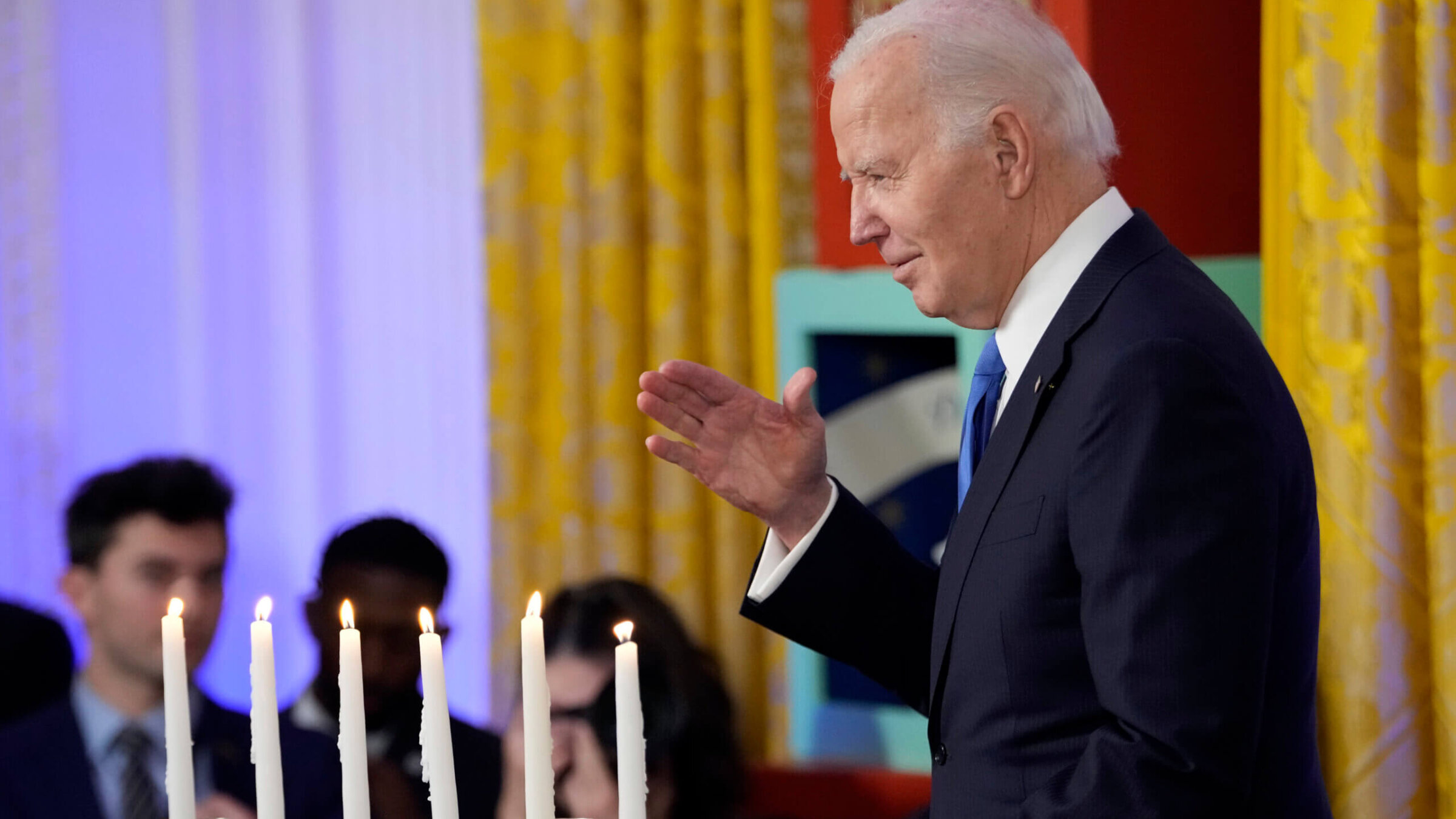Israel is no safe haven. So why are Jews defending Biden’s comments?
Like the president, we believe the myth of Zionism, while reality has moved on

President Joe Biden speaks at a Hanukkah reception in the East Room of the White House on Dec. 11. Photo by Jacquelyn Martin – Pool/Getty Images
There is no more ridiculous place to say, “Were there no Israel, there wouldn’t be a Jew in the world that is safe,” than at the annual White House Hanukkah celebration.
Picture the setting. You are surrounded by hundreds of your fellow Jewish Americans who have achieved success and influence in a country where only a tiny handful have experienced violent antisemitism or even discrimination. To enter, all of you have undergone the most rigorous security checks and screenings imaginable. You are served the finest food and drink under the watchful eye of the Secret Service, White House police and a detachment of Marine sentries, all while you are meeting the president of the United States.
Oh, and the Jewish guy lighting the menorah? That’s the vice president’s husband. If there is one place an American Jew feels safe, it’s at the White House Hanukkah party.
I’ve been to that event twice, and felt a lot of things — pride, patriotism, gratitude, a deep desire for seconds of the kosher lamb chops — but what I didn’t feel was unsafe. So, unsurprisingly, Biden’s comment, which the president delivered as part of his remarks at Monday’s annual Hanukkah celebration, struck a lot of people not as awful, but odd.
But just as odd was the reaction of so many American Jews — they agreed with Biden. Despite all evidence to the contrary, Jews in Israel and America continue to see Israel as a safe haven. My question is, why?
When Daily Beast columnist Wajahat Ali tweeted that Biden “will probably have to walk back or explain” his quote the next day, Jews strongly disagreed.
“Explanation: it’s true,” tweeted one.
“He was restating a core tenet of Zionism, affirming it and identifying with it,” tweeted Robert Silverman, a lecturer at Shalem College. “Israel is a safety net for all Jews. The vast super majority of American Jews are Zionists and understand this tenet.”
Judging by the other reactions, Biden’s gaffe was no gaffe — most American Jews feel the same way he does.
“As I said after the attack,” said Biden, referring to Hamas’ Oct. 7 attack that left 1,200 people dead in Israel, “my commitment to the safety of Jewish people, the security of Israel, its right to exist as an independent Jewish state is unshakeable. Folks, were there no Israel there wouldn’t be a Jew in the world who was safe.”
The president, who was born six years before the state of Israel, was voicing the classic assertion of pre-state Zionism: That only in their own country, in charge of their own destiny, could Jews find safety and security.
In the wake of the Holocaust, and after centuries of pogroms in Eastern Europe and discrimination in the Middle East, nothing made more sense. Even in the United States, antisemitism reached its peak between 1945 and 1950, when pollsters found 5-10% of Americans were “rabidly antisemitic” and 45% mildly so.
Biden came of age when Zionism represented the great blue-and-white hope for Jewish security, and his point of view remains anchored in that past. So does the education and outlook of most American Jews.
But things change.
It’s hard to know the counterfactual: what would have happened to American Jews had Israel not come into being. But we do know how reality has played out since. Since 1948, the greatest number of Jews who’ve been attacked and killed for trying to live as Jews have been Israelis, fighting for, defending or simply trying to live in their state.
As America became a safe haven, Israel became a danger zone. As I wrote back in February, “since the 1915 lynching of Leo Frank, antisemitic attacks have claimed 37 lives in the United States. In Israel, attacks have claimed 2,813 Jewish lives since 1993, with hundreds more injured.”
Tragically we need to add 1,200 more innocent victims to that number.
It is true that violent antisemitic attacks are on the upswing in the United States. Synagogues are disproportionately targeted in attacks on houses of worship — only mosques are more frequently attacked.
But these numbers don’t begin to approach the amount of terror Israeli Jews face. Right now, some 125,000 Israelis remain internally displaced, unable to return to their homes near the border with Gaza. As one young couple from Kibbutz Kfar Aza told the Forward, they may never feel safe enough to return.
In the north, more than 40 Jewish communities near the Lebanon border have been evacuated since Oct. 7 under the threat of Hezbollah rocket attacks. One father, now living with other families in a hotel in Nazareth, told NPR he has no intention of returning to his kibbutz unless Israel does to Hezbollah what it is doing to Hamas.
The place that Biden and entire generations of American Jews still believe to be a safe haven has shrunk from a country the size of New Jersey to a small California county.
These aren’t feelings; they are facts. I understand how they can often be at odds with the pride and joy, and even the sense of security, an American Jew feels when they touch down in Israel or thump their chest on social media.
But 3,000 years have given Jews a finely honed survival instinct, and even though I hear my American Jewish friends talking about hiding their stars of David and their mezuzahs, what I don’t see them doing is packing up for Israel.
I can understand why Biden would repeat rousing, antique Zionist platitudes at a White House Hanukkah celebration. But American Jews, we should know better than to believe them.






















